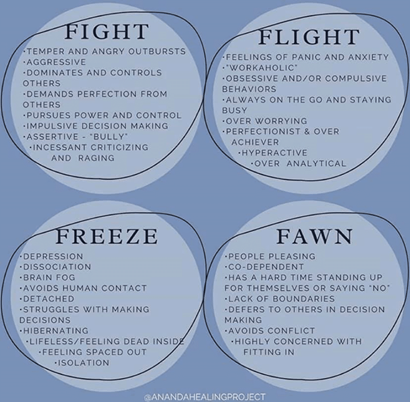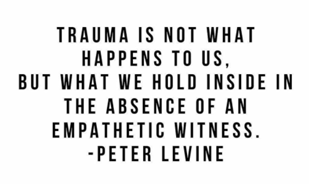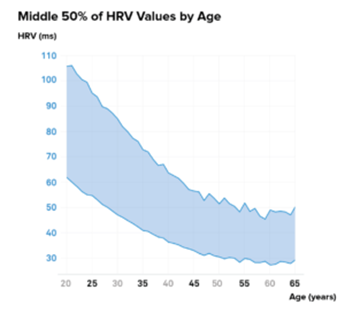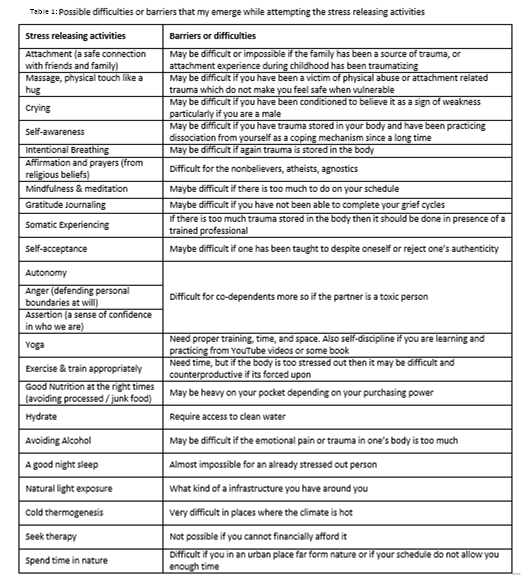By Omar Javaid (PhD)
Stress can be because of a few reasons. External stressors in the environment like a toxic work culture, unemployment, poverty, toxic or abusive relationship with family members or partner, etc. can cause a lot of stress. Or it could be because the nervous system has been stuck into a disbalanced state with a sympathetic dominance or the part of the autonomic nervous system (the sympathetic side) which is responsible for generating a stress response is not able to let go. If a stressor in the external environment has stayed for too long, like for few months or more, it’s possible for us to get stuck into a stressful state, and remain there unless a deliberate attempt to release the stress is not made. We can even stuck into such a state because of a high stress event like an accident or surgery even. Another important reason can be the inability to be to true to your emotions like anger and frustration and not being able to express them openly because of fear of rejection from people you depend on for financial or emotional support. Again remaining stuck with such people for long can put you into a habit of pushing your difficult emotions under the carpet and not allowing yourself to feel them fully, or express them even in an appropriate way even if the same people are no more around.

According to Peter Levine[1] and Bessel Ven Der Kolk[2], external stressors either long term like an abusive relationships or short term like a car accident, create a fight or flight response in our bodies. The body accumulates high amount of energy to generate a fight or flight response, and if we perceive that it is not possible to do that, then our nervous system typically shut us down and force us into a freeze state. In case of an abusive relationship or an unavoidable toxic work culture a response may even be to passively comply with all the demands to prevent any backlash, this can be referred to as ‘fawning’ (see Figure 1 above).

We are under stress when the energy mobilized by our nervous system to fuel fight or flight response is not fully allowed to do its thing. The energy which is stuck in our system is also referred to as trauma by Peter Levine, the more it is and the longer it remains stuck, the worse its impact on the systems in our body, immune system in particular. Often we suppress the fight or flight response because it may appear to us as socially inappropriate. Staying in such a situation for too long can make our nervous system stuck into a stressful state where the sympathetic part of our nervous system remains dominant, while the parasympathetic part become less or no more active.
Following is a list of activities recommended by different experts to regulate one’s stress:
(Here are the initials of the experts cited in the list below, click on their names to learn more about their work: GM: Gabor Mate | JM: Jo Marchant | WM: Wim Hof | PL: Peter Levine | BvdK: Bassel Van Der Kolk | RC: Rangan Chatterjee | AN&EN: Amelia Nagoski and Emily Nagoski | JM: Jenna Macciochi)
* Clicking on some of the following will also take you to more details …
1. Attachment (a safe connection with friends and family) (GM, JM, AN&EN, JM)
2. A hug lasting 20 sec or more (AN&EN)
3. Crying even if you don’t know any good reason (PL, AN&EN)
4. Self-awareness (GM, JM, RC, PL)
5. Intentional Breathing (JM, WH)
6. Affirmation and prayers (from religious beliefs) (GM, JM)
7. Mindfulness & meditation (JM, RC)
8. Gratitude Journaling (RC)
9. Somatic Experiencing (PL, BvdK, AN&EN)
10. Self-acceptance (GM, JM, RC)
11. Anger (defending personal boundaries at will) (GM)
12. Assertion (a sense of confidence in who we are) (GM)
13. Massage and Yoga (PL, BvdK)
14. Exercise & Train Appropriately (RC, AN&EN, JM)
15. Good Nutrition at the Right Times (avoiding processed / junk food) (RC, JM)
16. Habit to keep hydrated (but avoid over hydration (RC)
17. Avoiding Alcohol or other addictive substances (GM, RC, JM)
18. Good night sleep (RC, AN&EN)
19. Natural light exposure (RC)
20. Cold thermogenesis (WH, JM)
21. Autonomy (GM, BvdK)
22. Seek therapy (GM, PL, BvdK)
23. Spend time in nature (GM, JM, RC, WH)
24. Spending time with children (for the elderly) (JM)
So if the stressor is external, and it remains there, then doing the activities mentioned in the list of stress regulating activities above may have a limited impact, as the external stressor will keep triggering the sympathetic side of the nervous system. This implies that getting out of the external stressors is fundamentally necessary. This is very unfortunate for people who are stuck in poverty, unemployment and toxic relationships where escaping the circumstances is beyond their control[3]. Lockdown ironically has worsen this situation for many[4].
But somehow if you are lucky enough to have eliminated the external stressors or got rid of them or at least have been successful in creating some space for yourself despite the presence of external stressors, and wants to complete your stress cycle, then you can start with different activities recommended above.

Your choice of activity may depend on how much stress you have stored in your body. HRV is now being recognized as a sound measure of autonomic disbalance. If you have a smart watch or a wristband, then you can simply measure your HRV value over the period of a few weeks, and see if it’s on the lower side, if so then it perhaps means that your sympathetic part of your nervous system is more active than it should be. In parallel also notice:
· If your sleep is constantly disturbed
· If you are addicted to something (including work, shopping, music, games, junk food etc. and avoiding them generates withdrawal affects)
· If you panic easily or If some trigger gives you a full blown panic attack,
· If you feel sacred or anxious for no apparent reason
· If you get angry easily
· If you breathing is shallow,
· If you remain alert most of the time,
· If you easily get irritated most of the time,
· If you crave to eat junk or processed food more,
· If you get tired or burnout easily,
· If you get allergies or catch cold easily, or suffer from irritable bowel syndrome, or autoimmune,
· If you find yourself demotivated or have lost interest in what you loved to do
· If you find it hard to focus on the content of the present moment
· If there is constant tension in your muscles like in your shoulders or neck
(There are some stress measurement scales developed by concerned experts, click here to jump to them)
If some the above happens then perhaps you have stress stored in your system, and more of the above means more stress. So depending upon how much stress there is and how much it is stored there and for how long and for what kind of circumstances, you might want to pick up the activities mentioned in in the list of stress regulating activities above.
But the choice of activities is not as straight forward, and depends on some factors. If you are already stressed out then it might not be possible for you to sleep regularly and deeply unless you get it out of your system, if you are addicted to something, then again you would have to work on releasing some of the stress otherwise the withdrawal affects may be devastating. I personally find working-out difficult if I am stressed out. If you have been conditioned to believe that crying is a sign of weakness particularly if you are a male then you might find it hard to cry even when you need to. Lack of belief in yourself may not allow you to assert yourself, be autonomous, more so if you are co-dependent on your partner. If you have not been able to complete your grief cycle then it may be difficult to develop a sense of gratitude for what you have.
Table 1 below can help you evaluate which strategy to pick first depending on your circumstances and experiences. You might notice that trauma and stress trapped in one’s body in itself is a barrier in doing some of the above activities. But if one is able to bring the stress levels down by starting the activities which are easier (like getting some sunlight, trying some somatic awareness and experiencing, keeping hydrated, talking to some friend, writing down your feelings, or intentional breathing etc.) and release or process some of unresolved trauma then eventually they can get easier and may further help in keeping the stress and autonomic balance in control.
Chronic stress is painful, it literally cause inflammation in the body, which in turn may also cause depression as well. The resulting personality and behavior may not be socially acceptable or may put one’s financial security at risk. So if that is true for you then you might be unconsciously seeing yourself negatively as well. Gabor Mate says that often during childhood, children learn to prefer attachment over authenticity, they perform as per the wishes of their parents while suppressing their authentic reactions to unpleasant situations. So as a child you might have learnt to suppress your anger or disgust because it agitated your care givers [5].
Looking closely, it appears that the problem of stress is primarily a problem of disconnecting with one’s self, losing touch with one’s physiological and emotional needs as they arrive, for the sake of forcing ourselves into performing as per socially acceptable standards or as per the wish of a people around, more so if we are dependent on their acceptance or financial security. You cannot yell at your boss despite how toxic he or she maybe or leave the job just like that because of the obvious repercussions.

When we spend too much time in circumstances where we have to ignore our need to fight or flight or freeze for months or years, then a point come that we even forget what the need actually were. We just automatically drag ourselves into an unhealthy repeating pattern of suppression and performing in socially acceptable way, which turns vicious with its consequences on our psychological and physiological health. Constantly focusing on the things to-do at home or at work, perhaps makes us even oblivious of our needs to even breathe deeply, keep hydrated, go to toilet on time, take some sunlight, or consume healthy food, etc.
So the journey of recovering ourselves may start from noticing at first what actually our primary needs are!
Try to bring more and more focus towards your body to relearn what it actually needs, and try to honor the needs as they arrive. But if you have been disconnected for a long time then you might not even recognize at first what the need actually is, and it might even freak you out or even give you a panic attack. So try to go as slow as possible. Imagine if you have been ignoring even pushing away a person you live with for a long time, and then try to reestablish the relationship when you do not even know the language the person speaks. It is definitely tough at first.
You can start by paying attention to the minor needs emerging in your body like the need to change the posture while sitting, taking a deep breath every few minutes, drinking water as soon as the need arrive, etc. The needs appear minor but acknowledging them serves an important purpose: when we begin to notice and honor the needs, we eventually begin to form a long broken relationship with ourselves. Self-awareness can lead to self-understanding, and then deliberate attempts to honor the identified needs can eventually lead to self-acceptance and self-respect.
Peter Levine suggests that our bodies knows it naturally how to release the trapped energy, like it will shiver, tremble, tears will come out, breathing will become intense, you will fidget more, you might feel an instinctive need to move or shrink or stiffen certain muscles. Important thing is to form this relationship of respect where we listen to the body’s urges and create a safe space to behave the way it wants to behave [6].
It should be noted that stuff which people are addicted to like smoking, alcohol, sugary stuff, junk food, pornography etc. are not the needs, rather they are stuff which people consume to distract themselves from the pain of their unmet needs. If the primary needs are met instead, the addictive tendency may decline. Relapses will happen, but their frequency will slowly reduce. It may take a few months to a couple of years depending on the disconnect to form a relationship with oneself where we understand, value and honor all our needs, and thus eliminate the need to suppress the pain through smoking, alcohol etc.
The self-awareness will also help eventually to pick an activity from the list and not feel bad if the body resist instead, because there always is a good reason. Like if your body is resisting working out then there may be inflammation in your body, and working out may make it worse when your immune system rather pushes you to rest instead. So the self-awareness and respect will slowly tap in the wisdom of your body, and will eventually help you pick the next activity to incorporate in your lifestyle.
Most of the activities mentioned in the list above will not require some extra time, except like yoga, spending time in nature, and working out, but are to be integrated in our way of life, and state of being. So Pick up the stuff from the list, and see which are difficult for you and which are manageable, which can be immediately incorporated and for which you will eventually need assistance like therapy. You can then start with the stuff which you find easy.
Recommending readings
· ‘When the Body Says No’ by Gabor Mate (on the impact of stress on our bodies)
· ‘Why Zebras Don’t Get Ulcers’ by Robert Sapolsky (on the impact of stress on our bodies)
· ‘Cure: A Journey into the Science of Mind over Body’ by Jo Marchant (how our mental state affect our health and possible ways to cure)
· ‘The Four Pillar Plan’ by Rangan Chatterjee (on lifestyle changes to boost immune system)
· ‘Immunity: The Science of Staying Well’ by Jenna Macciochi (on lifestyle changes to boost and protect the immune system)
· ‘Burnout: The Secret to Unlocking the Stress Cycle’ by Amelia Nagoski and Emily Nagoski (on how to release the stress trapped in your body, but may not work for people with severe trauma)
· ‘Walking the Tiger: Healing Trauma’ by Peter Levine (on somatically releasing trauma from our bodies)
· ‘When the Body Keeps the Score: Brain, Mind, and Body in the Healing of Trauma’ by Bessel Kolk (on how the trauma is stored in our bodies and different therapeutic techniques to release it)
YouTube channels to follow:
· Wim Hof (on breathing techniques and cold thermogenesis) https://www.youtube.com/user/wimhof1
· On somatic experiencing and other therapeutic methods https://www.youtube.com/channel/UCpuqYFKLkcEryEieomiAv3Q
· Dr. Rangan Chatterjee https://www.youtube.com/channel/UCDnwlb3IQDPJtFysPUJbDFQ
The following channels do not offer any guidance on how to release trauma, however their videos helps me calm down if I am stressed out
· Jonna Jinton: https://www.youtube.com/user/JonnaJinton
· Liziqi: https://www.youtube.com/channel/UCoC47do520os_4DBMEFGg4A
· Nomadic Ambiance: https://www.youtube.com/channel/UCqRTj-Nu_8to3jIBlXptOtA
References
[1] Levine, Peter A. (2005). Healing trauma: a pioneering program for restoring the wisdom of your body. Boulder, CO: Sounds True
[2] van der Kolk, B. A. (2014). The body keeps the score: Brain, mind, and body in the healing of trauma. Viking.
[3] Maté, G. (2003). When the body says no: The cost of hidden stress. Toronto: A.A. Knopf Canada.
[4] Jia, R., Ayling, K., Chalder, T., Massey, A., Broadbent, E., Morling, J. R., Coupland, C., & Vedhara, K. (2020). Young people, mental health and COVID-19 infection: the canaries we put in the coal mine. Public health, 189, 158–161. https://doi.org/10.1016/j.puhe.2020.10.018
Bourdillon N, Yazdani S, Schmitt L, Millet GP (2020) Effects of COVID-19 lockdown on heart rate variability. PLoS ONE 15(11): e0242303. https://doi.org/10.1371/journal.pone.0242303
Grover, S., Sahoo, et al. (2020). Psychological impact of COVID-19 lockdown: An online survey from India. Indian journal of psychiatry, 62(4), 354–362. https://doi.org/10.4103/psychiatry.IndianJPsychiatry_427_20
Généreux, M. et al. (2021). The evolution in anxiety and depression with the progression of the pandemic in adult populations from eight countries and four continents. International Journal of Environmental Research and Public Health, 18(9), [4845]. https://doi.org/10.3390/ijerph18094845
[5] Gabor Maté — Authenticity vs. Attachment. Source: https://www.youtube.com/watch?v=l3bynimi8HQ, last accessed on 10th June 2021
[6] Levine, Peter A. (2005). Healing trauma: a pioneering program for restoring the wisdom of your body. Boulder, CO: Sounds True
No comments:
Post a Comment
Use of any abusive or inappropriate language will give us a reason to delete your comment.